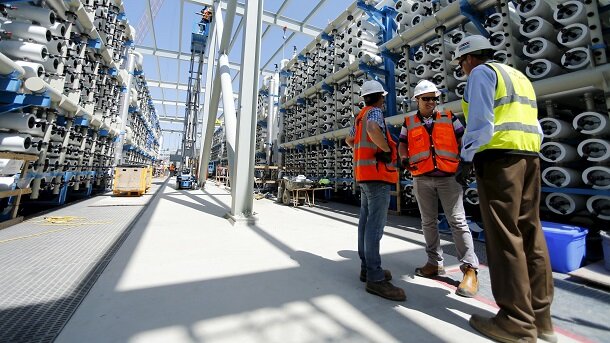350 knowledge-based products to address water challenges

TEHRAN – Domestic knowledge-based companies have produced 350 products to help solve water-related issues, Nader-Gholi Ebrahimi, secretary of the working group for the development of water and environmental technologies of the Vice Presidency for Science and Technology has said.
The products, designed by 300 knowledge-based firms, are related to desalination, purification and recirculation, removal of heavy metals and other pollutants, and various types of pumps, pressurized tanks in order to solve water challenges, he explained.
The Vice Presidency for Science and Technology has tried to find local and knowledge-based solutions to various water challenges by strengthening the country's technology ecosystem, he added.
With the development of technologies, whether in agriculture or other water-consuming industries, it is possible to reduce waste and hope for optimal management of limited water resources.
Over 7,000 knowledge-based companies are active in the country, manufacturing diverse products to meet the needs. In recent years, knowledge-based companies have not only prevented the departure of many of the country's talented figures but have also led to the return of large numbers of them, he concluded.
Knowledge-based and creative companies serve to preserve and protect the environment, Sourena Sattari, vice president for science and technology, has said earlier this week.
Health, environment, and food are three strategic and priority areas of national projects (knowledge-based and technological projects with commercialization abilities, implementation of which requires the extensive cooperation of various players).
Technology development in Iran
Despite sanctions putting pressure on the country, a unique opportunity was provided for business development and the activity of knowledge-based companies in the country.
Currently, over 7,000 knowledge-based companies are active in the country, manufacturing diverse products to meet the needs of the domestic market while saving large amounts of foreign currency.
The fields of aircraft maintenance, steel, pharmaceuticals, and medical equipment, oil, and gas are among the sectors that researchers in technology companies have engaged in, leading to import reduction.
Water resources shrinking
Iran’s renewable water resources have decreased from 130 billion cubic meters to about 102 billion cubic meters in less than 30 years, showing a 22 percent decline, deputy minister of energy for water and wastewater, Qasem Taqizadeh said.
The country's water resources must be managed on the basis of a document on adaptation to water scarcity, which has been prepared in cooperation with all water-related sectors, including the Ministry of Agriculture, the Department of Environment, the Ministry of Industry, and the Meteorological Organization.
The document emphasized that 9 billion cubic meters of groundwater consumption and 3 billion cubic meters of surface water consumption should be reduced in five years, so that, it will be possible to prevent subsidence and aquifers depletion.
A recent report by Nature Scientific Journal on Iran’s water crisis indicates that from 2002 to 2015, over 74 billion cubic meters have been extracted from aquifers, which is unprecedented and its revival takes thousands of years along with urgent action.
The statistic is unprecedented, as the total reservoirs of all dams in the country have a capacity of about 50 billion cubic meters; In other words, in the last 14 years, 22 billion cubic meters more than the capacity of all dams have been extracted from the country's underground sources.
FB/MG
Leave a Comment